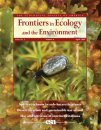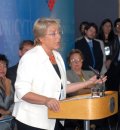The University of North Texas’ Biological Student Association held its annual Research Day on April 19th, inviting OSARA President Dr. Christopher Anderson to give the keynote address. This year’s symposium, coordinated by Benjamin Lundeen and inaugurated by UNT VP for Research Dr. Vish Prasaad, was the first time that the event sought to reach out to other departments and become a more interdisciplinary venue for undergraduates and students from other disciplines to participate.
Dr. Anderson’s talk, entitled The “Southern Summit’s” Relevance for Biocultural Conservation, was meant to provide a model for UNT’s students and faculty. It showed how the process of creating the Cape Horn Biosphere Reserve has been a long-term, interdisciplinary project that has linked research and society since 2000. The success and significance of this approach to science, research and conservation was apparent and the continuing committment of the university was provided by high officials to strengthen and expand this annual symposium. In addition, some of these very same students will participate in the Tracing Darwin’s Path field course in Cape Horn in June and December of this year.








